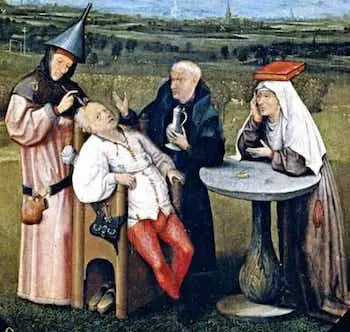Accept the inevitable impending hardship and endure the resulting pain with fortitude.
Bite the bullet
What's the meaning of the phrase 'Bite the bullet'?
What's the origin of the phrase 'Bite the bullet'?
I’ve always believed that, before the days of effective anaesthetics, soldiers were given bullets to bite on to help them endure pain. Sadly, ‘I’ve always believed’ has to be as poor an opening gambit as ‘a man in a pub told me’ in a piece discussing the origins of a phrase.
So, is it true or is it just ‘believed’? The theory goes that patients undergoing surgery would be given a stick of wood or a pad of leather to bite on in order to concentrate their attention away from the pain and also to protect against biting their own tongues. A bullet, being somewhat malleable and not likely to break the patient’s teeth, is said to have been an impromptu battlefield alternative. Lead poisoning would probably have been a secondary concern in those circumstances.
An ingenious correspondent has suggested that, as wooden sticks are known as billets, the stick-biting practice might have first been called ‘biting the billet’ which then modified to ‘biting the bullet’. Worth investigating certainly, but my initial enthusiasm was dampened rather by finding that no records of the phrase ‘bite the billet’ can be found in historical newspapers and other records. That would have been a neat solution but, lacking any supporting evidence, it seems best to discount it.
Many artists, notably Rembrandt Van Rijn and Hieronymus Bosch, painted scenes of early surgery and none of those paintings shows patients biting into anything. Whether or not they might have been offered anything to nibble on, there’s little doubt that they would have been fortified with strong drink.
The most frequently cited origin of the alleged ‘biting the bullet’ practice is the American Civil War. This seems rather improbable, as effective anaesthesia using ether and chloroform was introduced in 1846/47 and ether was issued to U.S. military surgeons as early as 1849 – well before the US Civil War began in 1861. The photograph to the right shows, albeit not too clearly, a patient undergoing amputation in a US Civil War field hospital, with a cloth, presumably soaked in ether/chloroform, held near his mouth. It doesn’t look like much fun but, given the choice, and apparently they were, surely patients would prefer unconsciousness to bullet chewing.
‘Biting the bullet’ does in fact date from before that war, as this definition of ‘nightingale’ in Francis Grose’s Classical Dictionary of the Vulgar Tongue, 1796 makes clear:
Nightingale. A soldier who, as the term is, sings out at the halberts. It is a point of honour in some regiments, among the grenadiers, never to cry out, or become nightingales, whilst under the discipline of the cat of nine tails; to avoid which, they chew a bullet.
That example also puts to bed the often repeated theory that the expression derived from incidents in the Indian Rebellion of 1857. The Sepoys were native Indian fighters who were recruited to fight with the British Army. When a new design of rifle was issued, which used greased paper cartridges that needed to be bitten to release their powder, the Sepoys objected on religious grounds. Hindus feared that the grease was made from cow fat and Muslims that it was made from what was equally repugnant to them, pig fat. The requirement that the Sepoys ignore their religious qualms and ‘bite the bullet’ is suggested as the source of the phrase. Whilst the incidents were certainly accurately recorded and were a catalyst for the Indian Rebellion, the earlier citation shows that they weren’t the source of the phrase.
The figurative usage of ‘bite the bullet’, simply meaning ‘show courage; display a stiff upper lip’, is appropriately Victorian. Rudyard Kipling wrote a dialogue in the 1891 novel The Light That Failed, which uses the expression where no actual bullet was involved but which alludes to the idea that fortitude can be gained by biting a bullet:
‘Steady, Dickie, steady!’ said the deep voice in his ear, and the grip tightened. ‘Bite on the bullet, old man, and don’t let them think you’re afraid.’
By 1926, the phrase had left the gory battlefields of the Boer War far behind and moved into the drawing rooms of the English upper classes, in the voice of Bertie Wooster, speaking to Jeeves in The Inimitable Jeeves, 1923:
Brace up and bite the bullet. I’m afraid I’ve bad news for you.
My ‘always believed that’, for this instance at least, looks to have been justified.
The history of “Bite the bullet” in printed materials
Trend of bite the bullet in printed material over time
Browse more Phrases
About the Author

Phrases & Meanings
A-Z
A B C D E F G H I J K L M N O P Q R S T UV W XYZ
Categories
American Animals Australian Bible Body Colour Conflict Death Devil Dogs Emotions Euphemism Family Fashion Food French Horses ‘Jack’ Luck Money Military Music Names Nature Nautical Numbers Politics Religion Shakespeare Stupidity Entertainment Weather Women Work
How did we do?
Have you spotted something that needs updated on this page? We review all feedback we receive to ensure that we provide the most accurate and up to date information on phrases.
